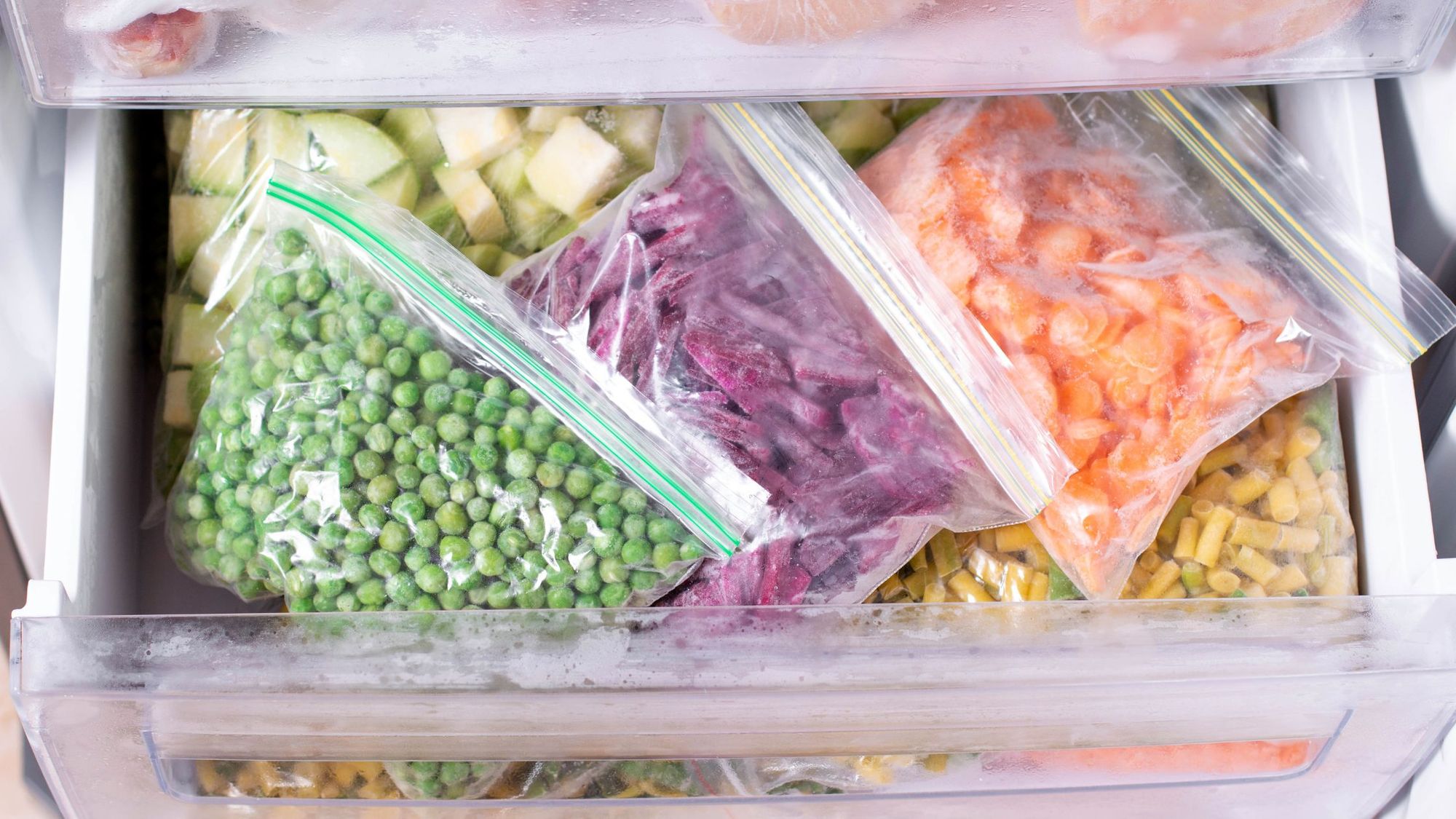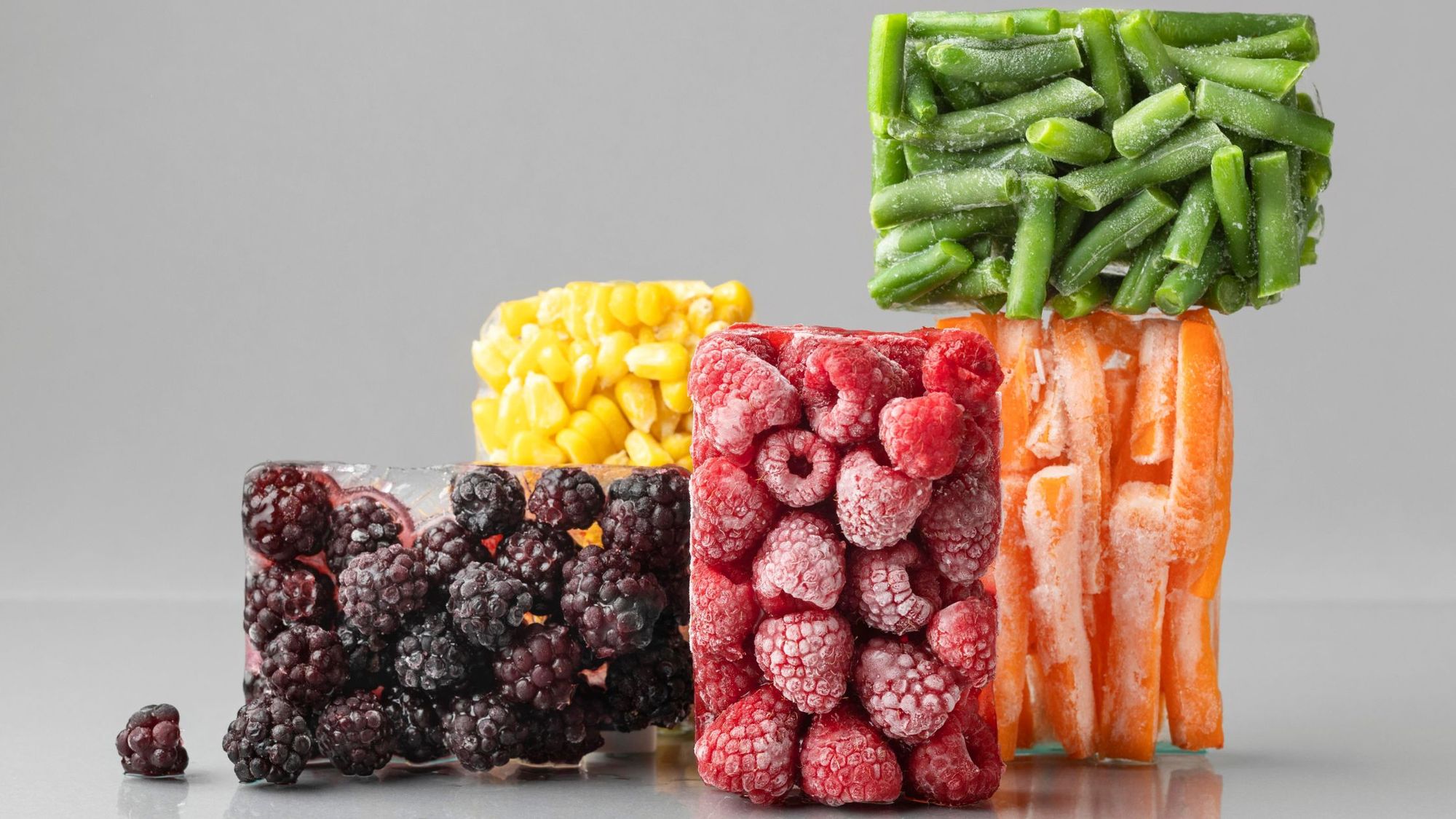
Is frozen food bad for you, and should you be cooking with fresh veggies? Should you be avoiding those frozen meals that are so quick and easy to microwave for dinner? The question, “Is frozen food bad for you?” is a common one, because there are a lot of frozen food myths out there. So, this question could be reverberating in your head.
For many of us, a hectic day makes it feel impossible to prepare a complex dinner, so you have no choice but to resort to a microwaveable frozen meal. The rigors of daily life don’t make it plausible for you to cook every single meal from scratch, using fresh ingredients coming from the farmer’s market.
Unfortunately, frozen food always gets a bad rap, because it’s not ‘fresh’ since freezing is akin to hitting a pause on nature. Moreover, people associate frozen foods with high sodium, loads of fat, and added preservatives. With these in mind, it’s no wonder why people have the words “is frozen food bad for you” coursing through their minds.
However, there’s no shame in buying frozen food because it is a convenient and sustainable way to get nutrients in this fast-paced modern world. Frozen items can be a healthy choice and help reduce food waste. But remember, what you choose to put in your freezer makes a big difference. Though this coldest part of your fridge is known for storing ice cream, you can shift it to a place for storing healthy meals and snacks which you can defrost at a moment’s notice. There are many myths surrounding frozen food so it’s time to clear the air.

Is Frozen Food Bad For You: Here’s What Science Says About Frozen Produce
If you’re wondering, “Is frozen food bad for you?”, the answer is not always a resounding yes. It depends on what you put in your freezer. For instance, when you’re pressed for time, it’s easier to resort to a frozen bag of veggies for a stir-fry instead of chopping up each ingredient one by one. That’s time-consuming and wasteful since you may not use them all up.
Studies show that produce frozen at the peak of freshness retains its nutrients. Overall, the vitamin components of veggies and fruits are comparable to their fresh counterparts. While produce from your favorite grocery’s produce section may look fresher, it doesn’t mean that the frozen counterparts are no longer fresh.
Bear in mind that frozen fruits and veggies undergo flash-freezing. This method of rapid freezing locks in the freshness and flavor of produce. As a result, their quality is preserved so they’re just as good and nutritious as those found in the supermarket. More importantly, frozen produce lasts longer compared to fresh which goes bad fast before you’ve consumed them. Hence, frozen produce could prevent spoilage and waste.
However, you must manage your expectations when it comes to frozen fruits and veggies. For example, carrots, corn, broccoli, snap peas, beans, and cauliflower freeze well. Some chefs recommend keeping a stock of these veggies in your freezer because they give you flexibility in your meal planning. In contrast, some items like blueberries and strawberries change their texture and consistency when frozen, so they’re best for smoothies or mixing with yogurt.

Popular Myth: All Frozen Foods Contain Preservatives
Many say yes to the question, is frozen food bad for you? That’s because they unknowingly believe that all frozen foods are loaded with preservatives. This sweeping generalization has given frozen food a bad reputation. It is a misconception that all frozen food items are loaded with preservatives, artificial colors, and food coloring. In reality, all of these added ingredients are not even necessary.
Bear in mind that freezing is an old preservation method that is sufficient enough to preserve nutritional value, taste, and texture of food better than other methods like salting or curing. The lowered temp also prevents microorganism growth, reduces chemical reactions, and delays metabolic reactions. So many of the frozen dinners in the grocery’s frozen aisles do not necessarily contain harmful additives since freezing itself is a natural preservative.
You may be surprised that many frozen dinners use high-quality ingredients. For instance, certain brands use real cheese and whole wheat pasta. If you want to make sure you’re getting the best food items for your freezer stash, the key is to read the labels. Frozen foods are not created equal. Some have labels such as:
- 100% real cheese
- Whole wheat
- Organic
- Reduced sodium
- Low fat
- Keto-Friendly
- Carb Smart
- Low Sugar
- No Additives
- No Extenders
Take time to peruse your frozen aisles to get the most nutritious frozen dinners that suit your needs. If you’re still feeling ambivalent and wondering is frozen food bad for you, remember that not all pre-packed meals are harmful to your health. For example, Marie Callender’s Beef and Broccoli Bowl is great to have in the freezer and a true lifesaver when you’re in a rush. It contains 19 grams of protein and tons of fiber from the broccoli to keep you satiated.
Carefully chosen frozen entree is a great choice for people who have no time to prepare a meal due to work commitments. Others also resort to boxed frozen single-serve meals because they have very little culinary skills or have no penchant for cooking. But remember, some frozen meals could never replace something that’s freshly cooked. Although hearty pasta dishes do well in the microwave, some meals like Salisbury steak with mashed potatoes just taste better when freshly made.
Fallacy: All Frozen Foods are Highly Processed With Tons of Salt
If you think of frozen Hot Pockets, then it’s easy to say yes to the question “is frozen food bad for you?” Indeed, some frozen food items are super-processed and high in sodium. That’s because salt is often used to preserve food and enhance flavor. However, times have changed and revolutionary ideas forced food producers to adapt.
Although these highly-processed, sodium-rich meals used to be the gold standard in the freezer section, the newly evolved fitness and health-conscious culture have forced food brands to create healthier frozen meal options with low sodium for when you don’t have time to cook.
Again the best way to do so is to read the nutritional label and ingredient’s list of all the prepackaged food that you are buying. Check out these tips to help you:
- Pay attention to the first few items since ingredients are listed from largest to the smallest quantity
- Go for products with a short list, since a longer list equates to more chances of having additives
- Opt for a low-sodium item with less than 600 mg
- Stay away from products with trans fats
- Read the calorie count and nutritional components per serving
Pros and Cons of Using Frozen Produce and Food
If you stock up on grocery specials on frozen fruits and vegetables, you can even save money. The same goes for frozen microwaveable dinners, which often go on sale. Buying frozen produce and food means you can enjoy your favorite summer peaches or berries as close to their nutritional best even in winter. And if you buy frozen meals like organic chicken tenders and lasagna, you can enjoy a comforting meal after a busy day at work with minimal prep work. With frozen entrees, you can just pop open a bag of salad and you’re done.
According to Ali Bouzari, a culinary scientist, “Freezing comes up at the top of preserving nutrients. If you can’t afford fresh or live in an area where a bodega down the street is all the access to products you can get, it’s important for people to know that frozen is a viable alternative.”
However, the main word to remember here is alternative. Frozen produce and food should not be the only meals in your life. You have to eat a balance of fresh and frozen to hit the five main food groups for optimal health. Here’s a quick list of frozen produce and food pros and cons:
If you’re wondering is frozen food bad for you and should you eat or cook with frozen food, the answer is it depends on you. There are many advantages and disadvantages to buying frozen produce and food as seen above. While aiming to eat fresh food makes sense, people don’t always have the time to do things from scratch.
Frozen food can be a great alternative if you don’t have the energy to meal prep and cook. For instance, a bowl of frozen berry and banana smoothie with kale is a nutritious on-the-go brekkie that won’t eat a big chunk of your time. It’s a fast, healthy meal thanks to the addition of frozen berries.
Should Frozen Food Have a Place in Your Life?
Asking is frozen food bad for you is a legitimate question that everyone should ponder on. If you’re looking for nutritious products to eat at home, don’t overlook the freezer aisle. Some of the best produce and pre-made food for when you’re in a bind could be behind those glass doors. The key is reading the labels and selecting the best products with high-quality ingredients. Take time to peruse the ingredient list and nutritional content to avoid additives and excessive sodium and fat.
If you make healthier selections, frozen food could be an excellent addition to your meal planning. Frozen veggies are a godsend when you’re rushing to prepare a home-cooked meal and don’t have time to peel and chop numerous vegetables. Similarly, single-serving boxed entrees could be a lifesaver when you suddenly have a meeting and come home starving. Frozen meals like organic chicken tenders that you can pop into the air fryer will satisfy your family’s taste buds and meet their protein requirements. Just prepare a side salad and some hot rolls and dinner is served in a jiffy!
Alternatively, you can also make your own frozen food stash if you have the time. For example, frozen carrots freeze extremely well. You can just julienne or cube what you need and keep them in freezer bags to save time when you’re rushing. Another idea is to prepare batches of your own frozen food. At least, you’ll know the exact ingredients that went into your frozen meals. For instance, stews, soups, and sauces freeze well. As long as you store food correctly, it can be safely consumed once thawed.
When handling frozen foods, it’s best to stay informed. Stay vigilant when it comes to reading labels to avoid products with poor nutritional value.
Consider taking a CircleDNA test as this comprehensive at-home DNA test will reveal the optimal diet for you, based on your genetic nutritional needs. It will shed light on possible food sensitivities and the diet type that suits you best. The reports provide insight into your nutritional needs so you can incorporate essential nutrients in your meal plans that are based on your unique genetic constitution.
References:
- Vitamin retention in eight fruits and vegetables: a comparison of refrigerated and frozen storage (Ali Bouzari et.al.)
https://pubmed.ncbi.nlm.nih.gov/25526594/ - 11 Frozen Vegetables You Should Buy (Even in the Summer), According to Chefs (Abigail Abesamis Demarest)
https://www.thekitchn.com/best-frozen-vegetables-chefs-summer-23184025 - Introduction to Freezing (FAO)
https://www.fao.org/3/y5979e/y5979e03.htm - Ranking the 10 Best Frozen Dinners (Domenic Marinelli) https://guiltyeats.com/2022/07/17/ranking-10-best-frozen-dinners/
- Why frozen fruit and veggies may be better for you than fresh (Lisa Drayer) https://edition.cnn.com/2019/05/30/health/frozen-fruit-vegetables-drayer-food/index.html






